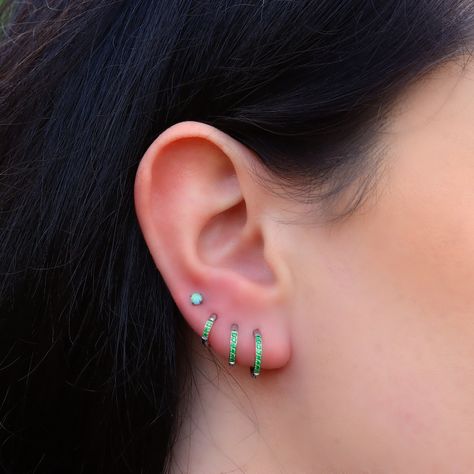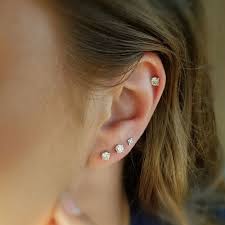Ear Piercing in Dubai: What to Expect Before and After

Ear piercing is a popular form of self-expression and fashion, and in Dubai, it is increasingly becoming a part of both traditional and modern culture. Whether it's for cultural reasons, aesthetic preferences, or personal style, getting an ear piercing can be an exciting experience. However, to ensure that the process goes smoothly and healing is fast, it's essential to understand what to expect before and after the piercing.
What to Expect Before Getting an Ear Piercing
Before you get an Ear piercing Dubai it's essential to take some steps to ensure you're fully prepared for the procedure. The process itself is relatively straightforward, but there are some things to consider in advance.
Choosing the Right Piercing
Dubai offers a variety of ear piercing styles, from classic earlobe piercings to more intricate cartilage piercings. It's important to think about the kind of piercing you want before the procedure. Whether you opt for a simple stud in the earlobe or decide to go for a more elaborate design on the upper ear, understanding the type of piercing you want will help you make an informed decision.
Hygiene and Safety
Hygiene plays a critical role when it comes to any type of body piercing. In Dubai, professional piercing services are committed to maintaining high hygiene standards to ensure a safe experience. The piercing equipment should be sterilized, and disposable materials should be used whenever possible. Make sure that the studio or location you're visiting adheres to strict cleanliness protocols to avoid complications.

The Piercing Procedure
The ear piercing procedure itself is quick and relatively simple. Professional piercers in Dubai will typically use a sterile needle to create a small hole in the ear, as opposed to using a piercing gun, which can cause more trauma to the tissue. The needle method is generally considered safer and results in less swelling or discomfort. You may feel a brief pinch when the needle goes through, but it should only last a few seconds.Most professionals in Dubai will also ensure that you are comfortable during the piercing process, so don’t hesitate to ask questions or express any concerns beforehand.
Aftercare for Your New Ear Piercing
After you’ve had your ear pierced, proper aftercare is essential to avoid any complications and to promote healing. The healing process can vary depending on the type of piercing, but there are a few universal steps that everyone should follow.
Cleaning Your Ear Piercing
One of the most crucial aspects of aftercare is keeping the piercing clean. You will need to clean the area regularly with a saline solution or a gentle antiseptic to prevent infection. This is especially important in the first few weeks following the piercing, as the area will be more vulnerable to bacteria. Be sure to follow any specific aftercare instructions provided by your piercing professional.
Avoiding Touching the Piercing
While it’s tempting to touch your new piercing, it’s essential to avoid doing so, especially with unwashed hands. Touching the piercing can introduce bacteria, which could lead to infections or other complications. If you need to adjust the jewelry, make sure your hands are thoroughly washed, and be gentle with the piercing.
Sleeping Position
One common concern after getting an ear piercing is how to sleep without irritating the new piercing. For the first few weeks, try to sleep on the opposite side of your piercing or use a travel pillow that prevents pressure on the area. Avoid any rough contact with the piercing, as this could cause discomfort or irritation.
Jewelry Changes
Most ear piercings require a period of healing before the jewelry can be changed. Typically, after six to eight weeks, you can switch out the jewelry if the piercing has healed sufficiently. However, it's important not to rush the process—changing the jewelry too soon can lead to complications. Always consult with the professional who performed your piercing to ensure you're ready for a change.
Monitoring for Infection or Irritation
While infections are rare when proper aftercare is followed, it’s essential to monitor your piercing for any signs of infection. If you notice excessive redness, swelling, or discharge around the piercing, seek professional advice immediately. In general, a little tenderness or swelling is normal during the healing process, but if the symptoms persist or worsen, it may be a sign that there’s an issue.
Frequently Asked Questions about Ear Piercing in Dubai
How Long Does it Take for an Ear Piercing to Heal?
The healing time for an ear piercing depends on the type of piercing and how well it’s cared for. Earlobe piercings typically heal within six to eight weeks, while cartilage piercings may take several months to fully heal. It's important to follow aftercare instructions diligently to ensure a smooth healing process.
Can I Wear Earrings Immediately After Getting a Piercing?
For the first few weeks, you should wear the jewelry that was used for the piercing to prevent the hole from closing. Once the piercing has healed, you can begin wearing different earrings. However, always wait until the piercing is fully healed before swapping out the jewelry to avoid irritation.
Is It Safe to Get an Ear Piercing in Dubai?
Getting an ear piercing in Dubai is generally very safe when done by a professional piercer who follows hygiene protocols. Dubai's high standards of health and safety ensure that ear piercings are performed in sterile environments, reducing the risk of complications. Just be sure to visit a reputable studio with experienced piercers.
Does Ear Piercing Hurt?
The pain experienced during an ear piercing is usually brief and minimal. You may feel a sharp pinch or pressure as the needle goes through the ear, but the discomfort typically subsides quickly. Most people find that the process is over before they know it.
Can I Swim After Getting My Ear Pierced?
It’s best to avoid swimming in pools, oceans, or other bodies of water during the first few weeks after your piercing. Water can introduce bacteria, which increases the risk of infection. Once the piercing has fully healed, you can enjoy swimming without concerns.
Final Thoughts
Getting an Ear piercing in Dubai is a simple and enjoyable experience when you are prepared and follow the proper aftercare instructions. Whether you are looking to add a new style or commemorate a special event, ear piercings offer an excellent way to express yourself. Be sure to follow all the recommended steps to ensure that your piercing heals properly, and you’ll be able to enjoy your new look with confidence.
